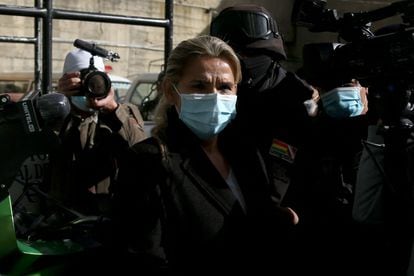Jeanine Áñez, during her arrest in La Paz in March this year LUIS GANDARILLAS / AFP
The Bolivian opposition has waited with expectation and then celebrated the result of the deliberation of the European Parliament on the human rights situation in the Andean country after the arrest of former President Jeanine Áñez and two of her former ministers, in March of this year, accused of participating in a coup against President Evo Morales in November 2019. The European Parliament has approved this Thursday a common resolution in which Áñez and his former collaborators are considered “political prisoners” and their detention is “denounced and condemned arbitrary and illegal ”. The resolution calls on the Bolivian authorities to "release them immediately and drop the politically motivated charges against them." It also calls for "a transparent and impartial justice framework, without political pressure",and urges the authorities to "provide all necessary medical assistance to guarantee their well-being."
The Bolivian ruling party had anticipated the European message. The Chamber of Deputies, controlled by the Movement for Socialism (MAS), approved on Wednesday a statement rejecting the interference of international organizations in Bolivian affairs. At the same time, Evo Morales tweeted: “We reject the interventionist initiative promoted by the extreme right in the European Parliament that promotes impunity in the face of deaths and serious human rights violations during the coup. Bolivia is a free people that exercises its sovereignty with dignity and identity ”. In addition, a close collaborator of the former president attacked the delegation of the European Union in Bolivia in 2019. According to the MAS, it contributed to the overthrow of Morales and the consolidation of Áñez's cabinet,to which he offered financial support and the rapid recognition of European countries.
More information
Former Bolivian President Jeanine Áñez goes through a depressive picture and stops eating in prison
The processes of former presidents in Latin America, a challenge for the credibility of justice
From the other side, Carolina Ribera, Áñez's daughter, thanked the European Parliament for its position.
“This is further proof that my mother's government was supported and continues to be supported by the international community.
We hope that the national government will take this resolution with the respect it deserves (…) and will not try to silence it with senseless attacks ”, he declared to the local press.
In its previous considerations, the document, which was approved with 396 votes in favor, 267 votes against and 28 abstentions, states that in Bolivia the separation of powers is not fulfilled and that the national justice acts many times for political reasons. He also intervenes in a very heated discussion in Bolivia, stating that Áñez succeeded Morales in accordance with the Constitution. According to this, there would not have been a coup, as the Bolivian ruling party alleges.
On March 12, the Prosecutor's Office incorporated Jeanine Áñez and her closest collaborators to a judicial process for the alleged coup in 2019. This process does not judge the repressive acts ordered by Áñez, as suggested by the tweet of Evo Morales. The former president and her ministers have been accused of terrorism, sedition and conspiracy for what they allegedly did before Morales' resignation on November 10 of that year. That is why the prosecutors were able to detain Áñez, because if the accusation referred to events that occurred during his term as governor, he would have had to be tried by Parliament. The defense argues that neither she nor the other defendants participated in the protests or in the political negotiations that preceded and followed Morales' resignation. At the same time, it has been noted that,instead, the actual leaders of these protests are not being investigated.
Both Human Rights Watch and Amnesty International have described Áñez's prosecution as political, something that is recalled in the European Parliament resolution.
This resolution repeats the criticism of the aforementioned human rights organizations regarding the breadth and ambiguity of the charge of “terrorism” in Bolivia and other similar countries.
Simultaneously with this process, the Bolivian Government has presented three accusations to the Legislative Assembly against Áñez and members of his cabinet.
The most serious of them blames her for the murder of more than 30 people in the repression of the protests against his Government in the towns of Sacaba and Senkata.
However, these accusations are unlikely to succeed because the MAS does not have the two-thirds of the votes required to prosecute a former president.
Subscribe here
to the
EL PAÍS América
newsletter
and receive all the information keys on the region's current affairs

